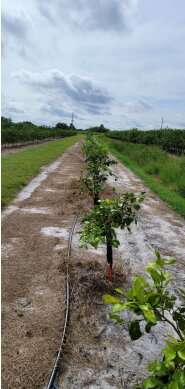Field trial of non-transgenic grapefruit on SCFV transgenic and control rootstocks. Credit: USDA Agricultural Research Service
Citrus greening, also known as huanglongbing (HLB), has emerged as the most significant disease in citrus (Citrus sp.) agriculture. The disease is associated with the Candidatus Liberibacter species of bacteria. The most prevalent and virulent species in this group is Candidatus Liberibacter asiaticus (CLas). It is primarily vectored by the asian citrus psyllid ACP (Diaphorina citri).
The bacteria and insect vector are present in many citrus orchards worldwide, including the United States, China, and Brazil. HLB often has a devastating impact on infected citrus; causing a rapid decline, with loss of fruit yield and quality and potentially leading to tree death. The bacteria has had a significant negative impact on the citrus industry, causing loss of fruit quality and yield, as well as loss of root mass, leading to tree decline. Finding a cure has been challenging due to the complexity of the CLas bacteria interactions with the citrus host and the asian citrus psyllid. Another factor that has made it hard to recover from the disease is the tendency of the citrus industry to focus on a small number of cultivars with commercially desirable traits, but little genetic diversity.
Researchers who are working to find a citrus cultivar that is HLB-resistant have a choice of either adding genetic variation through breeding with distant relatives or modifying the trees transgenically. In an article published this month in the Journal of the American Society for Horticultural Science, scientists present promising results from transgenic populations that produce antibodies that can bind with CLas proteins and reduce the bacteria's ability to replicate.
This study advances the research needed to test the durability and strength of any resistance conferred by expression in rootstocks to a grafted tree and will hopefully lead to the development of a novel protection strategy for HLB.
According to Ed Stover, a research horticulturalist with the USDA Agricultural Research Service, "The Florida citrus industry desperately needs more HLB-tolerant trees. If sufficient tolerance can be conferred by a single transgenic rootstock then it will greatly expedite implementation. Any transgenic solution will require extensive validation and analyses for non-target effects and food safety."
More information: Joseph Krystel et al, Novel Plantibodies Show Promise to Protect Citrus from Greening Disease, Journal of the American Society for Horticultural Science (2021). DOI: 10.21273/JASHS05078-21
Journal information: Journal of the American Society for Horticultural Science
Provided by American Society for Horticultural Science























